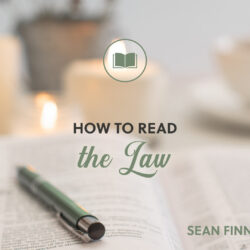Before delving into specific biblical doctrines, we need to first think about what the bible is. In this lecture you’ll learn what the bible says about itself, some reasons to believe God inspired it, as well as the major types of biblical scholars and how they approach scripture. This episode, along with the last one, serves to round out the introduction to this course.
—— Notes ——
bibliology: one’s understanding about the bible
- what is the bible?
- a library of 66 books
- written by 40 people
- how should you interact with it?
claims that God inspired the bible
- Matthew 1.22-23
- Mark 12.36
- Acts 1.16
- Acts 3.18
- Acts 4.25
- Acts 28.25-26
- Hebrews 3.7
- Hebrews 10.15-17
- 2 Timothy 3.16
- 2 Peter 1.16-21
- Revelation 1.1-2
reasons why I believe the bible is genuinely inspired
- it claims it
- predictive prophecy
- unflattering honesty
- medical insights
- martyrdom
- archeology
some more reasons
- ear-marks of eye-witnesses
- historicity of the resurrection of Jesus
- changed my life
- incredible preservation
- survived some Israelite and Judean kings who disregarded it (Manasseh->Amon->Josiah)
- survived 70 year exile in Babylonia
- survived Antiochus Epiphanes who tried to destroy the Torah
- survived destruction of Temple in a.d. 70
- survived destruction of Jerusalem in a.d. 135
- survived several Muslim empires
- survived all the crusades
- OT survived in high quality manuscripts (Aleppo, Leningrad, DSS, LXX)
- Diocletian tried to destroy the NT
- NT survived in over 5,000 Greek mss
- 531 language for whole bible, 1329 languages for NT
dichotomy today between bible-believing and bible-critical approaches to doctrine
- refer to youtube video of my lecture on Losing Faith from 500
- enlightenment gave rise to intense philosophical and biblical criticisms
- most bible professors in most secular universities examine the bible from an atheist worldview
- some Christians affirmed these criticisms but tried to save Christianity
- Schleiermacher (1822): feeling of absolute dependence; entering into Christ’s perfect God consciousness
- Albrecht Ritschl (1852): kingdom of God = community of brotherly love (focus on Jesus’ ethics not miracles)
- Adolf Harnack (1886): fatherhood of God, brotherhood of man, worth of each soul, love rather than law
- Walter Rauschenbusch (1917): social gospel movement—focus on humanitarian needs
- other Christians dug in and fought the criticisms
- John Locke (1695) published The Reasonableness of Christianity
- William Paley (1802) early proponent of intelligent design
- Charles Hodge (1874) defended infallibility and attacked Darwinism
- Fundamentalist Movement (1910)
- In 19th and 20th centuries the liberals and conservatives fight it out
- major denominations split (Methodists, Baptists, Presbyterians, Lutherans)
- as universities go liberal and biblical conservatives leave and start new schools
- 1806 Harvard splits to form Andover Theological Seminary
- 1908 Lyman Stewart started BIOLA; he’s the man who funded the 1910 “The Fundamentals”
- 1929 Princeton splits to form Westminster Theological Seminary
- 1976 Liberty University Founded as Lynchburg Baptist College by Jerry Falwell
- 1978 Regent University Founded as Christian Broadcasting Network University by Pat Robertson
four types of bible scholars today
- non-religious (majority)
- liberal Christians (mainline denominations)
- evangelicals
- Catholic/Orthodox
views of inspiration (list all 6 and describe for quiz)
- skeptical view (entirely a human creation, containing truth and error)
- the authors of the bible interpreted their experiences and told stories on the basis of what they believed God was and had done.
- mixed view (partially of human origin, containing truth and error)
- God inspired some parts of the bible but not others
- typically the parts of the bible rejected are those that conflict with present day views of morality, history, and science
- limited inspiration (partially of divine origin, containing truth and error (but not doctrinal))
- the bible holds authority with regard to belief and practice, but not with regard to history or science
- infallible but not inerrant
- inerrant (of divine origin, containing truth only)
- superintendence view: God had worked with those who wrote the bible, giving them experiences and understandings such that when they came to write, they communicated the truths/concepts God wanted (though not exact words)
- superintendence plenary verbal view (every word is exactly what God wanted)
- dictation view: God dictated the exact words he wanted written even if the writer didn’t understand them, making God the sole author and everyone else mere secretaries
views 1-2 put the reader over the text, at least part of the time
views 3-4 put the reader under the text, all of the time
- if you are over the text, you have a say in whether or not what it says is correct
- if you are under the text, when the bible disagrees with what you think, you are wrong and it is right
furthermore, depending on your view for inspiration, you will have a different methodology when it comes to forming bible doctrines
for this class we assuming the bible is true as it relates to doctrine (compatible w/ views 3 and 4)
- this is necessary to do biblical theology as opposed to liberal theology (ex. of Ehrman saying each gospel author had a different christology!)
principles of biblical theology
- Ask God for help to illuminate scripture through his spirit.
- Be willing to change if the preponderance of the biblical evidence turns out to challenge what you currently believe. The truth has nothing to fear.
- Don’t insist on figuring everything out. It’s better to live with uncertainty when it comes to a particular doctrine or practice than to force yourself to adopt a position that you know is flawed.
- Collect all the verses on the subject. This is best achieved by reading through the entire bible with your particular doctrine in mind. Alternatively, the internet or bible software can aid you in gathering the relevant texts.
- Take into consideration the history of redemption. In other words, don’t insist that something must remain unchanged from an earlier part of the bible to a latter section.
- Work to arrive at a position that has the greatest explanatory scope.
- Include others in your study. Invite criticism of your position. Iron sharpens iron (Prov 27.17).
- Figure out how to live this out today. What good are your beliefs if you don’t apply them to life?
—— Links ——
- See other episodes in this Theology Class
- Find more Restitutio classes here
- For more on correct bible study, listen to Interview 28: Exegetical Fallacies with Jerry Wierwille or these on bible interpreation
- Learn about the Atlanta Bible College








Around 52 mins….where in the whole Bible does it say that we don’t have to keep the law (ten commandments)? In the old covenant the law was written on tablets of stone, but in the new covenant the law is written on our hearts. Sin is transgression of the law and as Jesus told the woman caught in adultery, “go and sin no more”. If He was going to make the law null and void, surely He wouldn’t have bothered saying that. Also, why did He say He hadn’t come to change the law – not one jot or one tittle, etc.? And, why didn’t the woman anoint Jesus’ body when He died? (Luke 23:55-56 – And the woman also, which came with him from Galilee followed after, and beheld the sepulchre, and how his body was laid. And they returned and prepared spices and ointments; and rested the sabbath day according to the commandment.) Oops! Did Jesus forget to tell the woman who were always with Him that they didn’t have to keep the Sabbath any more? The Sabbath commandment has always been around, even before the law was given on Mount Sinai. When God rained down manna for the people to eat, this was before He gave them the commandments, and He distinctly specified that nobody was to gather manna on the Sabbath. The fourth commandment also says to “Remember the Sabbath…..”. How can anyone remember something they never knew? It’s always been in place along with the rest of the law and it always will be. “And hereby we do know that we know him, if we keep his commandments. He that saith, I know him, and keepeth not his commandments, is a liar and the truth is not in him. But whoso keepeth his word, in him verily is the love of God perfected: hereby know we that we are in him. He that saith he abideth in him ought himself also so to walk, even as he walked.” (1 John 2:3-6)
Wow, Sean! I listen to a lot of different podcasts, and I have to tell you…yours is definitely one of them. 🙂 Seriously, it’s not only one of them, it’s without question one of the best of them. And your intro to theology — and specifically this particular intro to bibliology — is fantastic.
It makes me wish my Bible teachers had laid out all the options like you have so that I would have discovered sooner where exactly I fit on the map of Christianity — not to mention the wider universe of religious beliefs.
As if that wasn’t enough for one episode, I really encouraged by the principles of biblical theology that you shared. There’s a lot of wisdom packed into those points!